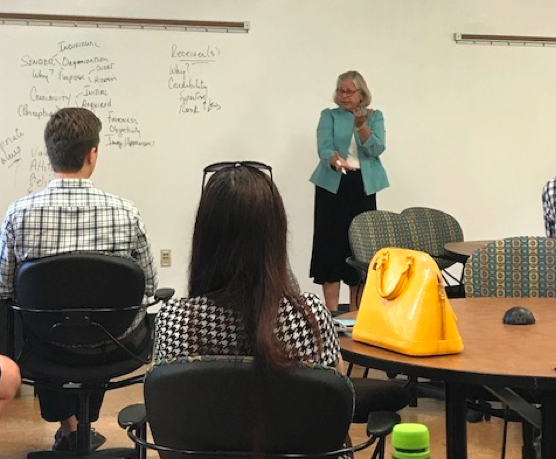June West is aware that, when you hear her speak or interact with her, there’s a lot of subtext humming just below the surface of that conversation. Not only are you evaluating her expertise – as someone who’s been in the business since 1972, starting in PR and now running her own consulting business, she’ll inevitably impress in that arena – but as a Darden School of Business Professor of Management Communications, you’re also evaluating Darden with her as a proxy. “The reason companies fail, I think, is a lot about communication,” she tells us, as an opening line. Her communications expertise was proven out right then and there – she certainly knows how to hook a group of hungry-for-knowledge startup entrepreneurs.
In her recent workshop on “Pitching from the Stakeholder Perspective,” West narrowed in on the ways – both overt and otherwise – that founders and startup employees establish their brand in the minds of listeners with each moment of communication. She emphasized how crucial it is to build credibility in every setting, whether you’re giving a formal pitch or answering impromptu questions from your seatmate on an airplane. Ultimately, every question can be distilled down to some notion of “why” – people want to understand why you and why this idea, and they want to be a part of your story.
“This is no time to be bashful, people,” West enthusiastically told the rapt cohort. Your credibility comes from your expertise, rank, fairness, objectivity, goodwill, and image/appearance. So she cautioned the founders to avoid “shrinking violet” syndrome and instead find ways to appear confident, clarify their message, and cultivate a leadership presence. Additionally, the business’s core messaging must filter down through all ranks of the organization. According to West, small businesses often don’t spend enough time early on thinking about their corporate values. Then, when they grow, they experience problems because they haven’t established their “VABE” (values, attitudes, beliefs, and expectations). Collectively, these are known to West as a company’s “family values,” and, to illustrate them more fully, she brought in a family member of her own, her son Nathan West of Mad Hatter Foods, an iLab alum.
Nathan shared with the group the passion behind Mad Hatter’s line of “super-condiment” hot sauces as well as the challenges inherent within that product space. “We’re not selling Maseratis, we’re selling a wholesale bottle of food,” so volume is key and differentiation is crucial. Through opening the vault of their own videos and storytelling, Nathan illustrated how Mad Hatter found the right balance between presenting credibility to retailers and authenticity to customers. Using words like “genuine” and “authentic” to describe the feeling they got when watching the promo video, the cohort echoed the very concept that June says is paramount to standing out as a brand – they “want to be part of the story.”

